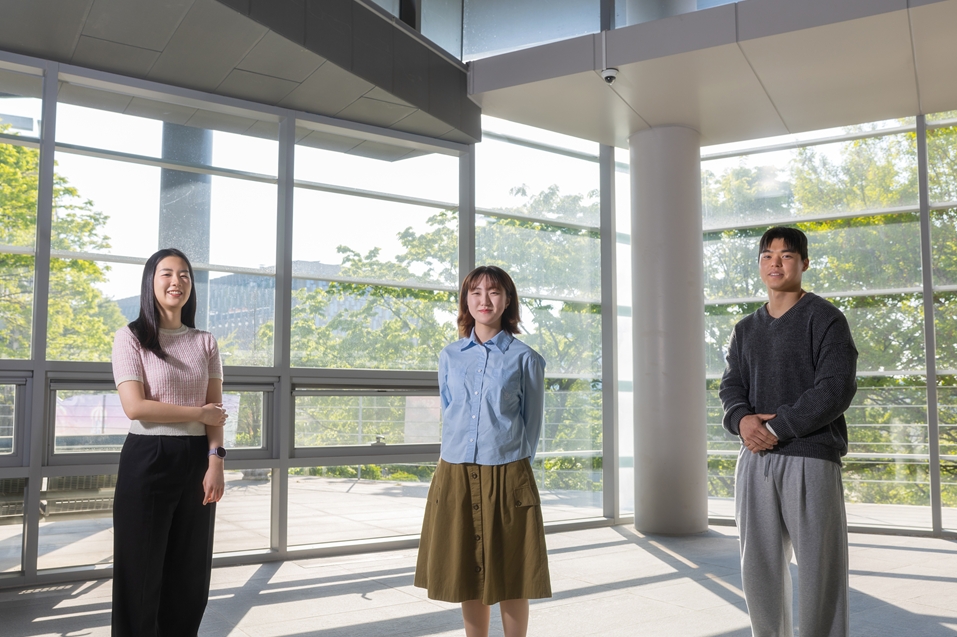
Around this time of year, students from the College of Education at SNU step into classrooms not as students—but as teachers. For a month, they take on the role of student teachers in middle and high schools, collecting raw, heartfelt moments they’ll never forget. Recently, Bogyung Shin, Jihyun Song, and Taegon Sim shared some warm stories from that unforgettable time.

Jihyun Song (Social Studies Education, M.A.), Bogyung Shin (English Education), and Taegon Sim (Physical Education)
Before stepping into classrooms, future educators spend a week observing lessons at SNU’s affiliated elementary school. Then, it’s off to middle or high schools—either affiliated or partner schools—where they spend four weeks teaching under the care and guidance of a mentor teacher.
“I was admitted to SNU through the special athletic track. I played rugby all through school, dreaming of going pro. But in high school, I began to wonder if that path was truly right for me. That’s when another dream came back to me—becoming a P.E. teacher. So instead of choosing a university famous for its rugby team, I set my sights on SNU, where I could study physical education.”
— Taegon Sim
“During exam season, I used to gather friends and help them study. When they ended up doing better on the test, it felt oddly rewarding. That sense of reward made me think teaching might just be the right fit for me.”
— Bogyung Shin
“My parents hoped I would pursue the path of academia, but I’ve always wanted to work in education. Since middle school, I dreamed of becoming a teacher. I applied to study education and chose Department of Social Studies Education because that’s the subject I love most.”
— Jihyun Song
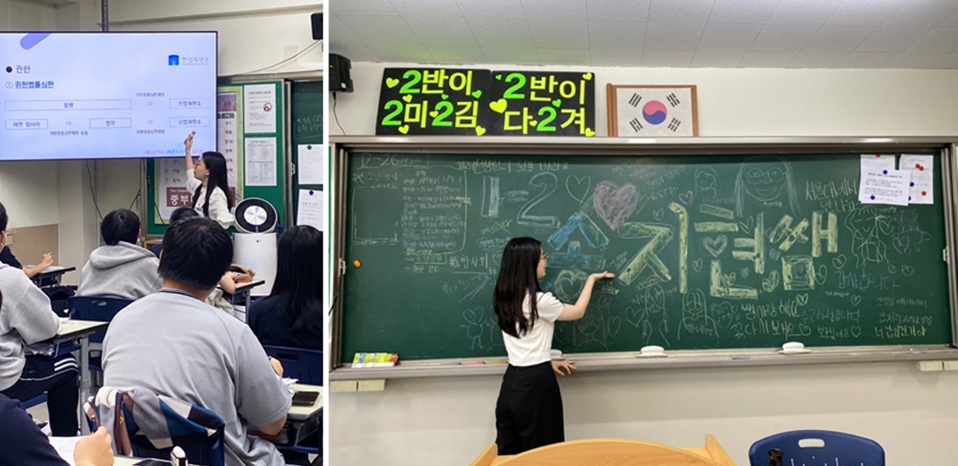
During a Politics and Law class, I brought in a casebook and explained tricky legal terms so my students could understand. (Jihyun Song)
Jihyun reflected on her experience as a student teacher: “I was still a student myself, so suddenly being ‘the teacher’ felt strange. I wasn’t quite sure where I stood—between the students and my mentor teacher—so I kept a bit of distance, trying to play the part. Looking back, I wish I’d just been myself and connected with the students more naturally. Before the practicum, I thought teaching was mostly about making learning fun so students could ace their exams. But my mentor teacher showed me something deeper—checking whether each student is actually keeping up and truly understanding. The experience taught me that a good teacher needs to be calm, flexible, and sure about the values they want to pass on. That’s why I decided to continue with graduate studies first.”
Taegon joined the "School-Based Practicum Semester System" run by SNU's Teacher Education Innovation Center—a program that lets future educators spend a whole semester embedded in a school. For 15 weeks, he commuted to his practicum school every day while continuing his major coursework at SNU. It was a challenging balance.
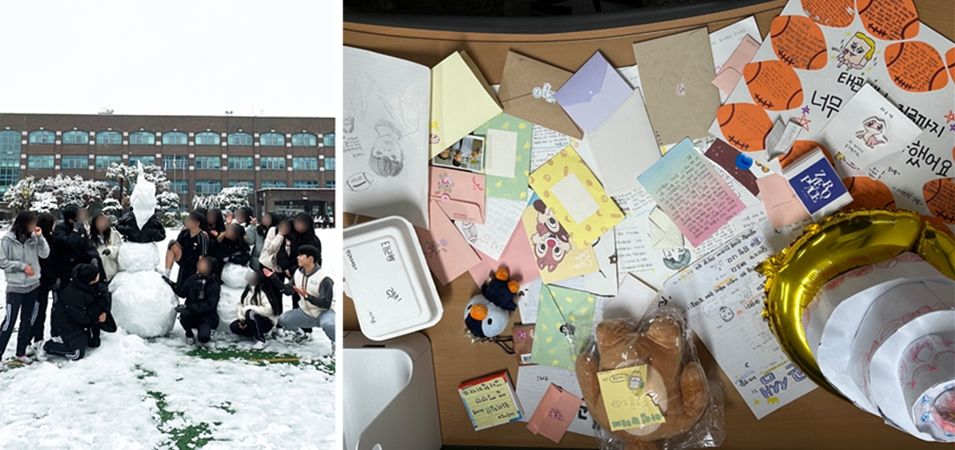
My students surprised me with a birthday gift—and on rugby match days, they cheered me on as a team. (Taegon Sim)
“I used to think that once you did your student teaching, you’d just naturally become a teacher. But once I actually experienced it, I realized only those truly committed to teaching take it seriously. In P.E. class, when a student cried after being hit or when kids argued over losing—I froze. I didn’t know how to handle those moments. I had taken classes on how to plan and teach P.E. lessons, but real-life moments didn’t always follow the plan. It was overwhelming at times—but reading the feedback my mentor teacher left in my lesson journal helped a lot. I learned different ways to approach teaching, and that gave me the direction I needed to move forward. One day it snowed so much that my mentor told me to skip class and just spend time with the kids. We built a snowman and took photos together. After that, something shifted. The students started to open up, and our connection flowed into the classroom. I even got to lead some of the class activities, and it actually felt like we were building something together.”
Bogyung had done plenty of tutoring, mentoring, and volunteer teaching before—so she thought the student teaching would feel pretty familiar. But standing in front of an entire classroom was a whole different story. Where should she look? How do you know what level to teach at? Those questions kept coming back to her, so she started with something simple but powerful: learning every student’s name.
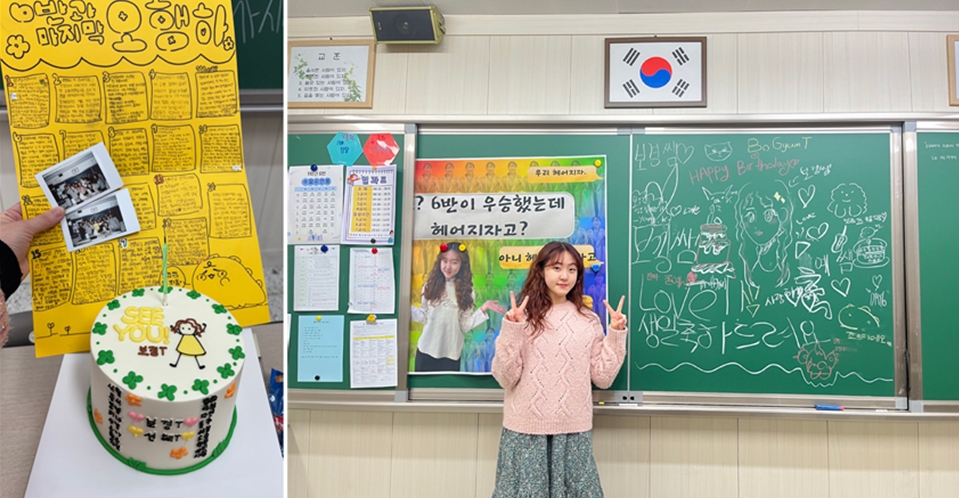
“You look just like this!” they’d say—bringing me pictures that matched my curly hair. One day, it was Hermione. (Bogyung Shin)
“Teaching isn’t just standing in front of kids and explaining things. It’s about building something together through communication. I tried to get to know what my students were interested in, and what their strengths were when it came to learning English, so I could really connect with them. Even though I was technically just a student teacher, the students treated me like a real teacher. They called me ‘teacher’ just the same. That made every word I said feel heavier. I felt a strong sense of responsibility—and I really wanted to live up to their trust. In our Department of English Education, we do a lot of lesson planning and demonstrations, and I was excited to finally put what I’d learned into action. But the expectations were high—and my students were all over the place. Some couldn’t even read the alphabet yet, while others were practically fluent. I wanted every 50-minute class to mean something for everyone—to help beginners learn something new, and give advanced students something to dive deeper into.”
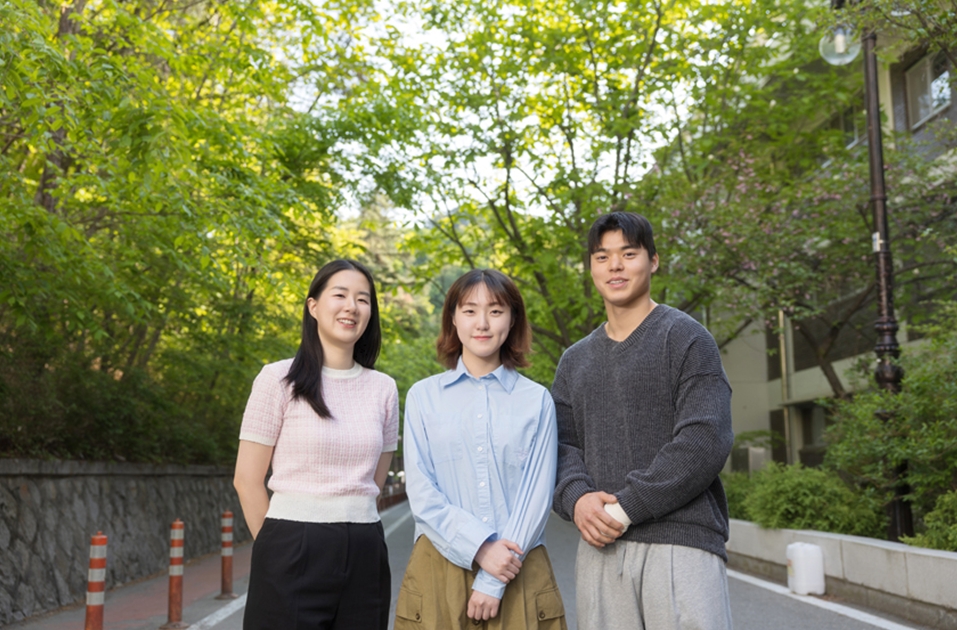
Through student teaching, their perspective grew—reaching beyond campus.
These three future educators are still growing and still shaping their path forward.
“The students would always ask, ‘Why do we have to do this?’ or just say, ‘I don’t want to.’ At first, I’d reply, ‘It’s study time, so let’s study.’ But later, I changed it up—‘Hey, isn’t this question kind of fun?’ (laughs) I even made up a class greeting: ‘O-haeng-ha,’ short for ‘Have a Happy Day’ in korean. It caught on and became our little inside joke. Just a small shift in words, and their whole vibe changed. That’s when I realized—what a teacher says can really shape the classroom.”
— Bogyung Shin
“I came to the College of Education because I wanted to be a teacher. But nobody around me, not even my classmates, seemed to be pursuing that path. People would ask, ‘You’re actually going to become a teacher?‘ It shook me. I was pretty lost for my first two years. But through the School-Based Practicum Semester System, I found clarity. If you’re sure about this path, then don’t let anyone make you doubt it.”
— Taegon Sim
“These days, people say becoming a teacher isn’t a dream worth having. They ask, ‘Why do we even need a College of Education?’ or ‘You’re really going to become a teacher?’ Those words frustrate me. School is where we imagine the lives we want to live. I believe a teacher is someone who helps students get back up—even when they’ve stumbled or made mistakes. If we remember that, I think we’ll find our way—one step at a time.”
— Jihyun Song

